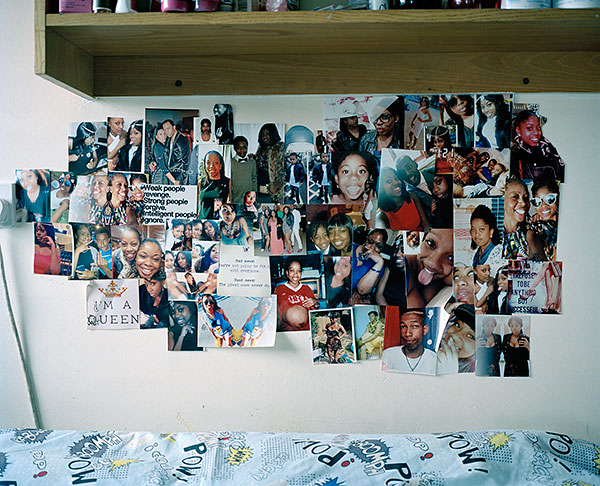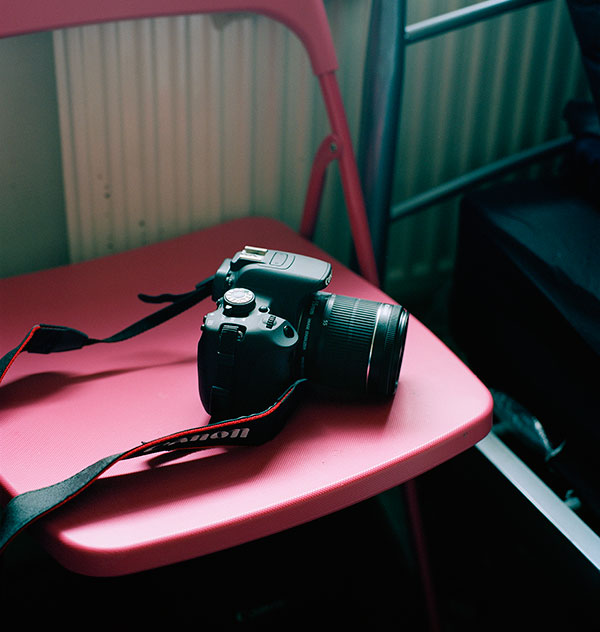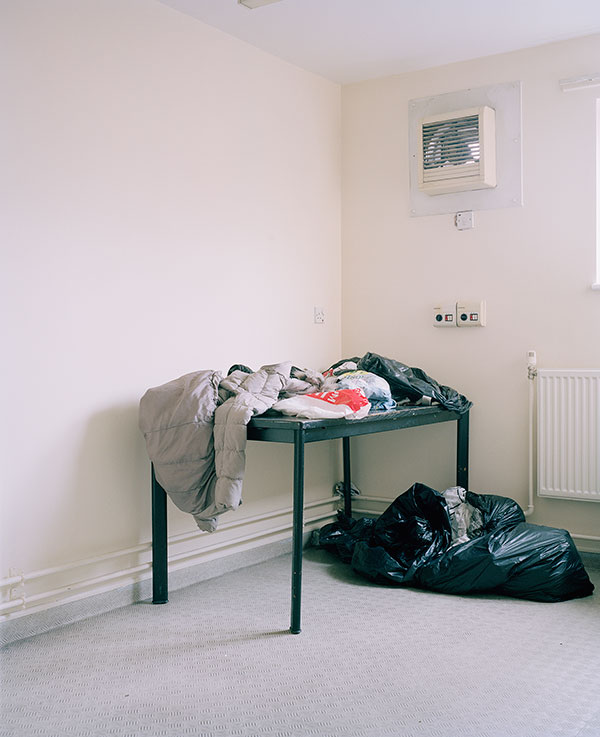How one room opened up the world for ex-homeless London teenager

Simply sign up to the Life & Arts myFT Digest -- delivered directly to your inbox.
Brookemorgan bubbles with optimism. “I love it here,” she exclaims, “really love it.”
From the outside, the anonymous building in one of south-east London’s busy inner suburbs has the chipped-paint feel of a college hall of residence. Inside, the 17-year-old’s smallish bedsit boasts big splashes of colour, an array of photos, cushions, a small television, speakers and a brightly patterned cover that turns the bed into a sofa. And then there is the impressive array of shoes. Everything, in other words, a teenager’s room should be. If there is anything at all strange, it is that it is all just so, well, tidy.
The last time I spent any time in this part of London it had a reputation as one of the capital’s badlands. Since then the streets have more than half-surrendered to the remorseless march of house price gentrification. As global plutocrats have bought up the prime property in the centre, native professionals have trekked farther south and east. Kebab shops must now compete with soya lattes, gastropubs and artisanal bakers. As Brookemorgan puts it: “I think everywhere has got a bit better in south London in terms of gang violence and things like that — the normal bad stuff you would hear in the news.” Her only complaint about the area now is the traffic noise.

The heavy locks and fingerprint identification system on the front doors of her building have another explanation. Home for Brookemorgan is a hostel for some of London’s young homeless. Run by the charity Centrepoint it houses up to 80 residents for spells running from months to years. It does not advertise its precise location because some of these young people are still living in the shadow of past domestic abuse and violence.
Favourite thing
So what among the treasures in her room is Brookemorgan’s favourite possession? She does not hesitate. “What’s my precious thing? Where is it? Oh, my keys.” She loves all the things in her room, especially those she has bought by saving from her weekly allowance. And the camera has a really special place. But the keys are what really count. “My keys enable me to have my own space. I think my room is where I’m most creative. [It’s where] I come up with new ideas. I have my notepads. I’m always jotting things down . . . But my room key’s significant because my room’s tranquil and it’s just a space of calmness, so, yes, my keys.”
Centrepoint, which boasts Prince William as a committed and active patron, offers support, guidance and often a home for several thousand 16 to 25-year-olds in London and Britain’s big cities. What sets it apart from some homeless charities — and, full disclosure, I have been a supporter for some years — is that it is much more than a short-term refuge. It is about changing lives, or more accurately, about helping disadvantaged young people to change their lives.
Many arrive at hostels like this bearing the scars of a broken home life; some with physical and mental health problems. Centrepoint provides more than a temporary roof over their heads. They also need sustained help and guidance with education and job opportunities. Security and stability are key. Residents can live for up to two years at one of the hostels. The ethos, though, is about self-reliance. Case workers, education and employment advisers are on hand to provide the help, but the young people, often from backgrounds that have not nurtured much in the way of ambition, are encouraged to make their own life chances. Part of the deal is that they learn to stand on their own two feet — to socialise, cook their own meals and manage a small budget — as they develop their talents.
Brookemorgan has taken the challenge to heart. After falling out badly with her mother — “our relationship broke down” — she spent some time living with her grandmother. Next came a nomadic few months relying on friends for somewhere to sleep. So what was sofa-surfing like? “Bumpy, depending on the sofa”, she jokes. But then more seriously: “No, I just felt like a liability to the people I was sofa-surfing — yes, because it’s a bit awkward. You don’t really have a set room, there’s no level of privacy and you can’t really do anything about it because you are not supposed to be there.”

She arrived at Centrepoint last year after her teachers picked up that she was homeless. Now she has her own room and a kitchen shared with a neighbour. “I’ve got loads of pictures, it’s bright, I’ve got loads of pinks.” Downstairs, as in a student residence, there is a TV room, computer and gym areas. You would not call it plush, and there is something of the institutional grey about the communal areas, but for anyone who has spent time living out of a suitcase or, as is the case with other residents, on the streets, the hostel is a lot more than just a refuge.
Brookemorgan has had the space and time to rebuild her relationship with her mother. “I’ve made up with my mum and our bond is now stronger than ever and she’s a strong pillar in my life.” She admits that cooking — or rather an abject failure to cook — is her weak point. The kitchen, she complains, is too messy. Otherwise she thinks the Centrepoint philosophy is spot on. As a young person you need support, but “at some point you have to say, ‘I’ve had a bad life and I know it feels bad but this is no longer what I want’”. The tidiness is part of it: “When you are at home you might be a bit lazy . . . Oh throw this on the bed.” Now: “You come into my room — and like, ‘oh, your room’s nice’. Yes, it’s mine.”
As for the future, Brookemorgan is aiming high. She wants to be a film director, and is studying media, music and drama at college. When she completes the course this summer she has a short internship arranged with a film company. She knows how important it is in the business to build networks, and pays close attention to her LinkedIn profile. “For now, in terms of building up a repertoire of work, I want to focus on short documentaries, short films and TV hopefully. But then ultimately the goal is to be directing psychological thrillers, which I love.” Her present project is an anti-piracy campaign advertisement — a 21st-century digital take on the old cinema warnings about sneaking in cameras to steal intellectual property.

The film and media business, I suggest, is tough even for those who have had all the advantages. She’s unmoved. Her second most precious possession is an impressive looking Canon 7D camera, which was paid for by a Centrepoint educational bursary. “It’s awesome. I was recently shooting a Centrepoint workshop. They run a sewing workshop and I am going to be doing that — just taking loads of footage from there as well and putting it all together in a documentary, and it could be featured in Centrepoint’s Got Talent.” Sadly, this particular show is not open to outsiders.
She mixes her filming with a love of music. “I know another resident in here. He sings as well and he’s set up a little studio in his room. Not the best, but it gets it done, and the music he produces actually does sound really good, so I’m working with him. He’s going to do me a few beats and I’ll shoot his music video — that’s our deal.”


Brookemorgan is also vice-chair of the Centrepoint Parliament, a forum representing the charity’s residents in hostels across the country that seeks to focus attention on the issues most important to young people. At the moment it is running a campaign to promote mental health and wellbeing. “We want to defeat the stigmas of mental health and all the other things that come with it,” she says.
I leave guessing that not everyone with a room at Centrepoint can have quite the same level of energy and exuberant confidence. But thinking also how a secure environment, encouragement and a measure of prodding give young people a chance to make their own luck. “I’m quite an independent person and so I think Centrepoint just giving me the space is fabulous,” says Brookemorgan. “I can just come here and this is like my tranquil sanctuary.”
To learn more about Centrepoint’s room sponsorship scheme, please visit centrepointroom.org.
Philip Stephens is the FT’s chief political commentator
Photographs: Harry Mitchell
Comments